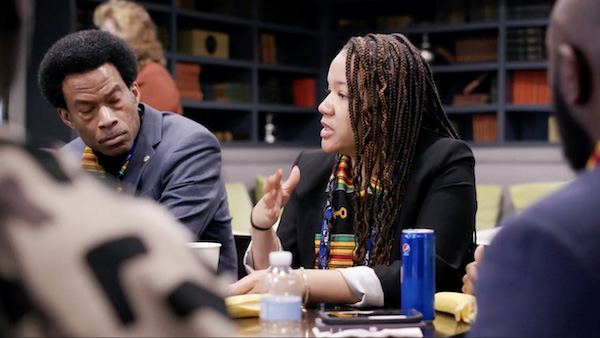Television Review: “The Big Payback” — The Road Toward Reparations
By Sarah Osman
The Big Payback, directed by Erika Alexander and Whitney Dow. Available to stream on the PBS Video app.
The Big Payback doesn’t exhibit a clear slant either way: it simply tells the tale of how a bill asking for reparations came to be, along the way highlighting how past injustice shapes present inequities.

Robin Rue Simmons, national leader for local reparations in Evanston IL, in a scene from The Big Payback. Photo: The Big Payback, LLC/ PBS
The only successful coup in American history occurred in 1898 in Wilmington, North Carolina. Following reconstruction, the city of Wilmington became synonymous with Black excellence. The metropolis brimmed with Black doctors, lawyers, and shop owners — some were so wealthy they had white servants. The white powers-that-be, their dominance threatened, defended it by massacring the Black population. Frightened women and children hid in the cemetery as the terrorists made the “Cape Fear River run red with blood.” The Black community was devastated by the killings. And justice for the victims? To this day, North Carolina has yet to pay any sort of reparations to the descendants of those murdered. Lawyers have even advised not to use the word “reparations,” but to ask for compensation.
The Wilmington Massacre served as the blueprint for later efforts at mass murder of Black communities. One of the legacies of this racial violence is a massive wealth disparity between Black and white communities throughout the United States. Proving that this gap was caused by discrimination and generational trauma has been difficult in American courts. Securing reparations has been nearly impossible. But there are encouraging signs of change, the possibility that reparations — or compensation — may no longer simply be a dream. The documentary The Big Payback, co-directed by Erika Alexander and Whitney Dow, chronicles one woman’s quest in Evanston, Illinois, to make the first government-funded reparations program a reality.
The Big Payback centers mostly around Alderwoman Robin Rue Simmons, who introduced Resolution 126-R-19, which asks for reparations to local Black residents in Evanston. The quest begins in 2019 and follows Simmons through the era of Covid to 2022. The challenging impact of the virus is dramatized in simple but effective ways: Simmons’s daughter does her best to enjoy her lackluster Zoom college graduation. At times the doc’s timeline is hard to follow; some time stamps would have helped alleviate the problem. Still, the confusion is a minor irritation given how well the documentary shifts its focus, looking at the overwhelming impact Covid had on the Black community.
Alexander and Dow are not biased documentarians. The Big Payback doesn’t exhibit a clear slant either way: it simply tells the tale of how this bill came to be, highlighting how past injustice shapes present inequities.We hear from multiple members of the community, including those who are against the idea and those who don’t think Simmons is doing enough. The directors interviewed both Black and white subjects, both of whom express views one would not necessarily expect them to hold.
Still, it is difficult to keep track of who the various subjects are and why they were chosen to be interviewed. Some of the interviewees, such as the owner of a popular BBQ spot whose views on reparations may come as a surprise, make sense. Others appear to be random folks who were happy to volunteer their perspectives. Yes, it is important to have the voice of the community, but we should have some sense of why people are being consulted, particularly when they don’t contribute much of substance to the debate.
Again, this is a quibble. More important is that the documentary handles the controversial idea of reparations carefully. In addition to following Simmons’s crusade, we also hear from Congresswoman Shelia Jackson Lee, who has been trying to pass a national reparations bill for the past 30 years. It has gone nowhere in Congress. Lee provides historical context for the bill: this debate isn’t just limited to a suburb on the outskirts of Chicago. Financial reparations for physical and economic harm aimed expressly at the Black community is not a new idea, but the mechanism for legal restoration (“making whole”) is troublesome for many Americans.
Of course, the issue of reparations for past crimes against communities of color reverberates internationally. Given the enormous reach of the issue, it’s understandable that Alexander and Dow don’t delve into how other American communities — particularly those in the South — are addressing the issue. But a follow-up to The Big Payback is warranted. I, for one, would love to see a sequel where the co-directors explore the idea of reparations in places like Wilmington, North Carolina. As Americans continue to come to terms with their past — particularly unjust treatment of ethnic minorities — reparations will be an essential part of accepting responsibility for unremediated crimes. There is no one-fits-all-solution, but the work of activists like Simmons and Lee are making the small steps that may lead to a more equitable future.
Sarah Mina Osman is a writer residing in Wilmington, NC. In addition to writing for the Arts Fuse, she has written for Watercooler HQ, Huffington Post, HelloGiggles, Young Hollywood, and Matador Network, among other sites. Her work was included in the anthology Fury: Women’s Lived Experiences in the Trump Era. She is currently a first year fiction MFA candidate at the University of North Carolina Wilmington. When she’s not writing, she’s dancing, watching movies, traveling, or eating. She has a deep appreciation for sloths and tacos. You can keep up with her on Twitter and Instagram: @SarahMinaOsman
